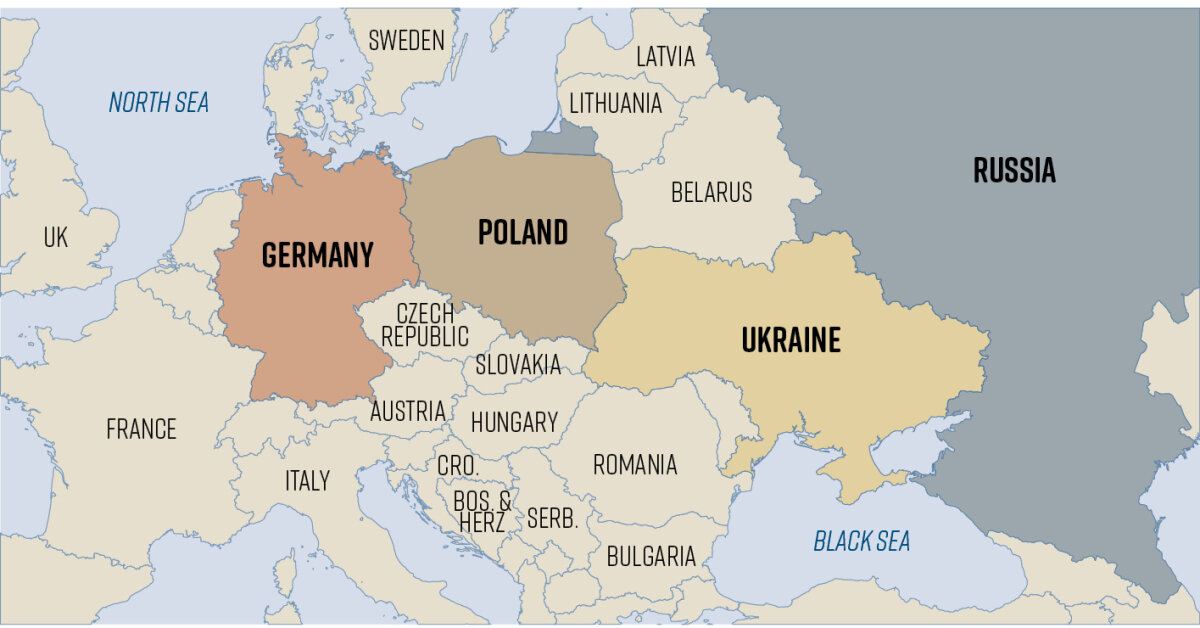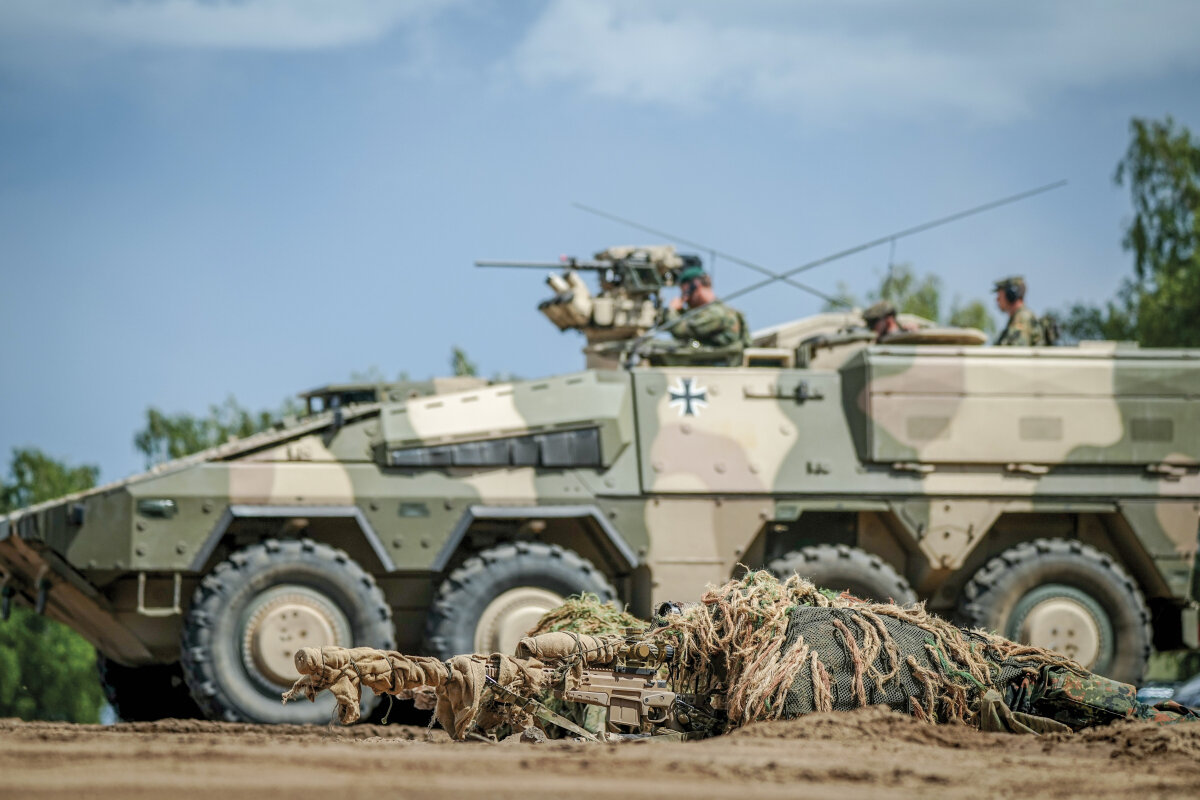Poland Under Attack
On Dec. 13, 2023, Germany won one of its most important victories of the modern age. As a new Polish government was sworn into office, Germany eliminated one of the biggest roadblocks to European power.
The new government moved fast. A new migration pact that took the European Union closer to becoming a superstate was passed. A new EU budget, largely designed by Germany, was approved.
Then Germany announced its first-ever permanent overseas military base, breaking yet one more taboo that had stood since World War ii.
Under Poland’s new leadership, suddenly judges faced the prospect of being kicked off the Supreme Court. Presidential pardons have been overturned. When armed police forcibly took the national public news channel off the air, it even looked like a coup had taken place.
Germany is taking control of Poland—but this is just one step on the road to a much larger, earthshaking goal.
Germany’s Number One Obstacle
Poland’s Law and Justice party (PiS), which had governed Poland since 2015, stood directly in the way of Germany’s European ambitions. Its leaders repeatedly exposed Germany’s domination of the EU. In 2021, party leader Jarosław Kaczyński accused Germany of trying to create a “Fourth Reich” “built on the basis of the EU.”

In September 2023, Kaczyński warned Sieci newspaper of “German-Russian plans to rule Europe.” Prime Minister Mateusz Morawiecki said Germany’s support for a united Europe was “utopian and therefore dangerous.”
Many critical steps toward transforming the EU into a superstate require unanimous consent from all members. Poland has often stood in the way. The PiS government frustrated Germany in other ways too; for example, it demanded $1.4 trillion in reparations from Germany for the destruction it had inflicted in World War ii.
The EU fought back. In October 2021, the European Court of Justice began fining Poland €1 million per day, its heaviest penalty ever, accusing the Polish government of interfering in the judiciary. PiS responded by threatening to leave the union entirely.
Meanwhile, PiS was transforming Poland into one of the EU’s most powerful militaries. It aimed to spend double the nato minimum on its military to build the largest land force in the EU. Poland is buying upgraded American M1A2 Abrams tanks and F-35 fighter jets, as well as 1,000 older tanks and 600 pieces of artillery from South Korea.
Pushing Poland out of the EU, or moving toward a superstate without it, must be tempting to German leaders. But it would also make the EU much less powerful.
Instead, on December 13, as Poland’s president swore in Donald Tusk as prime minister, Poland was brought under German control.
Tusk has, among other things, served as president of the European Council, the EU’s guiding body. His new foreign minister, Radoslaw Sikorski, is famous for saying, “I fear German power less than I am beginning to fear German inactivity.” The last time Sikorski was in that office, he was one of the loudest voices in Europe calling for more German military leadership.
Election Steal?
Poland’s election on October 15 was hard fought. There are no accusations of hacked voting machines or interference with mail-in ballots. But Germany’s efforts to push Tusk across the finish line were a forceful exertion of the “soft power” it has developed across Europe, using the media, think tanks and EU political machinery to influence public opinion (article, “Watch This Man Closely,” page 10).
German leaders tried to rally Poles against PiS for months. Manfred Weber, leader of the European People’s Party—the largest group in the European Parliament—said his party was “building a firewall” against the PiS “enemies.”
In the face of these attacks, the Polish legislature passed a resolution in August condemning “foreign interference” in Poland’s elections—singling out Germany.
Then, in early September, government corruption gave Germany a gift. The deputy foreign minister was fired over accusations that he was involved in helping potential migrants obtain fast-tracked Polish visas with a $5,000 bribe.
The EU typically refrains from intervening in national issues ahead of an election to avoid being perceived (rightly or wrongly) as tilting the scales. This time, it scheduled a debate on Poland’s visa scandal just two weeks before the vote. Clare Daly, a member of a Polish party critical of PiS, condemned the European Parliament, of which she is a member: “I am no fan of the Polish government … but I am not a fan either of this parliament being used to thumb the scales in a domestic election battle,” she said. “To do that is an abuse of the parliament’s position.”
Nevertheless, the attack was joined by German elites all the way to the top. German Chancellor Olaf Scholz accused Poland of weaponizing anti-immigrant rhetoric while throwing open the doors to migrants themselves. The German government highlighted the issue by imposing checks on Germany’s usually open border with Poland.
Did Germany ‘Buy’ Ukraine?
Germany may have also helped swing the election by using Ukraine.
Dominika Cosić, Brussels correspondent for Poland’s public broadcaster, the tvp, claimed that “according to off-the-record conversations in Brussels, Germany and France allegedly promised Ukraine a fast entry to the EU if Kyiv helped overthrow the current Polish government.”
Former PiS Prime Minister Beata Szydło responded, “Yes, the German authorities are currently focused on making a fast change in the European treaties to make the EU a federal state with member states reduced to the role of parts of the federation. … The Polish government will oppose the transformation of Europe into a federation ruled not even from Brussels, but from Berlin. That is why German politicians are increasingly open and aggressive toward Poland. Is Germany ‘buying’ Ukrainian authorities with the promise of fast entry to the EU? It is possible. But then the Ukrainian authorities would be extremely naive.”
A spat between Poland and Ukraine over grain shipments played a key role in PiS’s defeat. They made themselves unpopular by falling out with Ukraine over the issue. But did Ukraine deliberately provoke an argument at Germany’s bidding?
Just days after Tusk was sworn in, Ukraine was officially granted EU membership candidate status—perhaps as a reward for its help in making it happen.
Ukraine has clearly changed its tune on Germany. Earlier in its war with Russia, it stood up to Germany. When German President Frank-Walter Steinmeier wanted to visit Kyiv in 2022, Ukrainian President Volodymyr Zelenskyy told him Germany’s support for Russia meant he was not welcome. Last September, Zelenskyy called for Germany to be given a permanent seat on the United Nations Security Council. That’s quite the turnaround. Ukraine has clearly come to the same conclusion as Poland: Germany rules Europe. It is desperate for Europe’s help—Germany’s help—and it has decided that flattering the Germans is the way to get it.
Military Advance
Donald Tusk eked out a narrow win. The October 15 election was inconclusive, but PiS was the largest party in Parliament, so it had the first shot at trying to form a coalition. They failed; instead Tusk’s Civic Coalition party allied with the Third Way and the Left to form an “anybody but PiS” coalition on December 13.



On December 18, Germany announced its first permanent overseas military base since World War ii. Five thousand solders, including tank and artillery battalions, will deploy to Lithuania. Not coincidentally, directly in between Lithuania and Germany is Poland.
Analyst Peter Zeihan responded to the news: “I cannot underline enough why that is important.” German troops have deployed abroad. But this has been in temporary bases and almost always as part of a coalition. In developing the logistics and skills necessary to maintain permanent bases abroad, one of the last effective restraints on German military power just fell.
“This reminds me of the last seven major wars that the Germans were in,” Zeihan said. “There was a period of disarmament if they lost and then it ended and the Germans started using military tactics again and stuff got real—really, really fast.”
But Germany needs Polish support, at least to get off the ground. So this deal only became possible once the new Polish coalition was sworn in—after which it was concluded within mere days.
Germany could soon set up bases in Poland itself. Its former ambassador to Poland, Arndt Freytag von Loringhoven, wrote that “Germany should take advantage of this opportunity” provided by Tusk’s victory. These opportunities could include “closer integration of armed forces and, in the longer term, a permanent transfer of troops to Poland” (emphasis added).
Critics Silenced
Tusk also moved quickly to cement his control of Poland domestically. On Dec. 19, 2023, Tusk’s government launched its bid to illegally shut down the state-owned news station tvp Info, tvp3 and the English-language tvp World.
Poland’s constitution is similar to the U.S.’s. A law must be voted on in the Sejm, the lower house of parliament, then approved by the Senate, then signed by the president. Under Tusk, the Sejm passed a nonbinding resolution and Tusk acted as though it were law. Polish police entered the offices of Poland’s equivalent of the bbc and fired staff. The tv signal was taken off the air and website traffic was redirected.
PiS supporters rallied behind the tvp, and the fight continues.
Tusk accused tvp of siding with PiS. The outlets invite PiS guests more regularly than others. But many non-PiS partisans were shocked by the heavy-handed way they were shut down. The president of the Association of European Journalists, Ralf Schneider, said, “It does not bode well when a newly elected government in an EU country tries to silence criticism.” Taking over tvp gives Tusk and his allies more power. It also silences one of Europe’s loudest anti-German voices.
On December 20, the Sejm passed another resolution trying to take control of the National Judiciary Council (njc). PiS had changed the way Poland appointed senior judges. Now Tusk and his allies are trying to unseat all new judges and perhaps even roll back all njc rulings. Poland’s Constitutional Tribunal and Supreme Court are all in their sights.
The same day, the EU agreed to a new Pact on Migration and Asylum—one that PiS would have blocked. The pact introduces much tougher measures to keep migrants out than the EU has approved before. But it also requires countries unaffected by a wave of migrants to either take in tens of thousands of them or pay large amounts of money in compensation. EU leaders also agreed to a new Stability Pact. This is unlikely to prevent Europe’s financial crises, but it is another example of German leaders moving quickly to get their way once Polish opposition was removed.
Revived Empire
Poland’s PiS clearly saw something the Trumpet has warned about for years: the reality that Germany rules Europe.
In August 1950, Herbert W. Armstrong predicted that “the world will be stunned, dumbfounded, to see Germany emerge suddenly in a power never equaled by Hitler—by a union of 10 nations in Europe, probably including some at present puppets of Russia—in a gigantic United States of Europe. … Soon the ‘United States of Europe’ will emerge, with Germany at its head” (Plain Truth).
In his 1999 booklet Germany’s Conquest of the Balkans, Trumpet editor in chief Gerald Flurry writes, “It will not be long before Europe is reunited as the Holy Roman Empire. It will be led very assertively by Germany.” Earlier in the booklet he writes: “The historical plan of the European Union was to control a dangerous Germany. But it is clear that Germany is controlling the EU!” That may have been controversial when it was written, but today many Poles recognize the truth of that statement all too well.
Mr. Armstrong warned that Germany would rise again at the head of a “European Union” all the way back in 1945. At the same time, he warned that so many of Germany’s Nazis were going “underground.” Today, that is a proven fact. Historians have investigated all major government departments and found that they were stocked with numerous Nazis. Foubert adds press and propaganda to that list.
Mr. Armstrong was so far ahead of today’s news because he relied on Bible prophecy.
Revelation 17:8 describes a beast, symbolic of a major world power, that “was, and is not, and yet is.” This beast exists, then vanishes, only to then “ascend out of the bottomless pit.” You could say it comes out of nowhere—from “underground.”
The seventh and final head of this empire will be ruled over by 10 kings. “The seventh head with its 10 horns, in the 17th chapter, will be … the revival of the beast, the Roman Empire, ‘out of the bottomless pit’ by a ‘United States of Europe,’ or federation of 10 European nations centered within the bounds of the old Roman Empire,” wrote Mr. Armstrong (Who or What Is the Prophetic Beast?).
This union of 10 kings is clearly a military union. The Bible says these kings shall “make war” (verse 14).
Is this the end for Polish resistance to Germany? Actually, Bible prophecy reveals it may still have a role to play.
A Religious Power
Many Law and Justice leaders remain solidly opposed to Germany. “Years later, Hitler’s dreams will come true without the use of force [and] without resistance from Poles,” tweeted constitutional court judge and former Law and Justice M.P. Krystyna Pawłowicz.
M.P. Paweł Lisiecki tweeted: “Poles did not fight and die during World War ii so that German troops could be ‘permanently stationed’ in our country again.”
Tusk’s new governing coalition is bitterly divided and may not hold together long, and Law and Justice still controls Poland’s presidency.
But there is one force that could make German control of Poland much easier.
For years, Germany has been pushing for a federalized Europe with greater control over its member nations. At times, progress has been slow. In the January 1979 Plain Truth, Mr. Armstrong wrote: “The nations of Europe have been striving to become reunited. They desire a common currency, a single combined military force, a single united government. They have made a start in the Common Market [which later became the EU]. They are now working toward a common currency. Yet on a purely political basis, they have been totally unable to unite. In only one way can this resurrected Holy Roman Empire be brought to fruition—by the ‘good offices’ of the Vatican, uniting church and state once again, with the Vatican astride and ruling (Revelation 17:1-5).”
The next year, he wrote that Russian military aggression “will be the spark to bring the heads of nations in Europe together with the Vatican to form a ‘United Nations of Europe.’ The politicians cannot do this by themselves. Only with the collaboration of the pope can they do it” (co-worker letter, Jan. 23, 1980).
The Law and Justice party may be anti-German, but it is pro-Catholic. A papal endorsement of forfeiting more sovereignty to better unite Europe could give the party a whole new view of the project.
The Law and Justice party actually matches the future that the Bible prophesies for Europe in key ways. It is led by Catholic religious convictions. German and Western reports that it has “strongman” leadership are largely true. When this party was in power, Jarosław Kaczyński was Poland’s strongman, even though he held no elected office.
The Law and Justice party may return. But for Germany to allow that, the party must learn its lesson. Opposition to Germany will not be tolerated.
